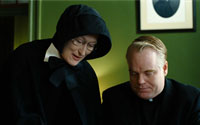 |
Would it be
wrong of me to suggest that Doubt, a fine film overall,
should’ve stayed on Broadway because it doesn’t accomplish
anything on a technical level that demonstrates it had to be
made into a movie? I don’t think so—admittedly I’ve never seen
the play—because writer/director John Patrick Shanley (adapting
from his Pulitzer-prize-winning source) essentially just points
a camera at what would’ve existed onstage anyway. While the
medium of film shored up four amazing actors and will bring
Doubt exposure, it doesn’t allow the material to offer the
same viewer-relationship I assume its source captured because
Shanley doesn’t take full advantage of filmic devices. Just as
theatre has its own unique way of bonding with an audience, so
does film – and for this bond to be forged, a filmmaker and his
editor must hone camerawork, transitions, staging, et cetera.
Doubt, while not technically incompetent, remains blocked
and constructed like theatre, awkward in film. As a result, the
picture doesn’t pack the punch it should have, but is
nonetheless worthwhile for its thought-provoking script and
Oscar-worthy acting.
The premise is
simple, but invites far-reaching thought. It’s 1964 in the Bronx
at the Saint Nicholas Church and School, where Father Brendan
Flynn (Philip Seymour Hoffman) is the priest. Father Flynn’s
view of the Church’s role in its patrons’ and students’ lives is
less old-fashioned than that of school principal Sister Aloysius
Beauvier (Meryl Streep)—in one scene he sets her off by
suggesting the children sing a secular song at their Christmas
performance—making him a subject of grimacing resentment. This
comes to a tragic head when Sister James (Amy Adams), the
intimidated new history teacher, tells Sister Aloysius about an
instance in which Father Flynn called Donald Muller (Joseph
Foster) down to the rectory for no apparent reason, implying he
may have molested Donald. Sister Aloysius at first has no doubt
Father Flynn committed the act, confronting him and forcing him
to provide an excuse. He says hat Donald was drinking altar-wine
and he wanted to handle it without having to follow official
procedure and expel Donald from the altar-boys. But Sister
Aloysius still has her suspicions, pursuing Donald’s mother
(Viola Davis) and vowing to have Father Flynn removed from the
Church.
The story
quickly surpasses any gimmicks it may have lent itself to in the
hands of a lesser writer. Shanley invites the viewer to consider
the full range of possibilities to explain what happened. Yes,
Father Flynn either molested Donald or he didn’t, but the
situation isn’t that simple. Perhaps the reason why Sister
Aloysius is so confident or that Sister James brought it up in
the first place is that they themselves were molested as
children and are paranoid. Or perhaps Father Flynn really did do
it and their assumptions are right; after all, he does in one
scene lecture the boys on grooming their nails properly and
sweats profusely when Sister Aloysius questions him on the
matter. And even if he did do it, perhaps it’s best that it’s
kept quiet, as Donald’s mother painstakingly admits to Sister
Aloysius because she sees no bright future for her
African-American son if he doesn’t get through prized Saint
Nicholas to qualify for college. Account for the general feeling
of instability in the country—the film takes place during the
Civil Rights movement, just after the assassination John F.
Kennedy—and you’ll realize what a complex web Shanley has spun.
The
performances hit all the right notes. Hoffman, with
seamlessness, is able to play Father Flynn as both sleazy and
caring. How he shifts from one to the other and back in a single
moment I’m not entirely sure, evidence that he is one of our
best working actors. Hoffman effectively skews towards a more
sympathetic portrayal because the accusations against his
character are so great that they provide all the doubt one needs
to consider the possibility that something went on in the
rectory. Said accusations are made with menacing vigor by Streep,
who is as good as ever and delivers an unforgettable,
stomach-churning character-epiphany in the film’s final scene.
Supporting the two leads are Adams, dependably playing the
vulnerable trigger of the calamity, and Davis, who in single
passage will truly break your heart and may soon be regarded as
the Oscar-frontrunner.
But again I
return to the question I posed at the beginning of this review.
Had these four actors appeared in a run of the stage-play,
Doubt would’ve been more powerful that way. It’s a movie
with so many lovable qualities but it’s strangely unlovable
itself because, from the first oddly-lensed shots, there’s a
feeling that the breathtaking material belongs in a different
medium. It’s hard to get to the root of this—I could bore you
with dissections of individual frames and transitions all
day—but it’s a feeling that surfaces often. While Doubt’s
amateur aesthetic and assembly become easier to ignore as the
film becomes progressively engrossing, the film is nonetheless
marred from emerging as the full-scale masterpiece it could have
been.
-Danny Baldwin,
Bucket Reviews
Review Published
on: 12.12.2008
Screened on:
12.3.2008 at the Aidikoff Screening Room in Beverly Hills, CA.
Doubt is rated PG-13 and runs 104
minutes.
Back to Home

